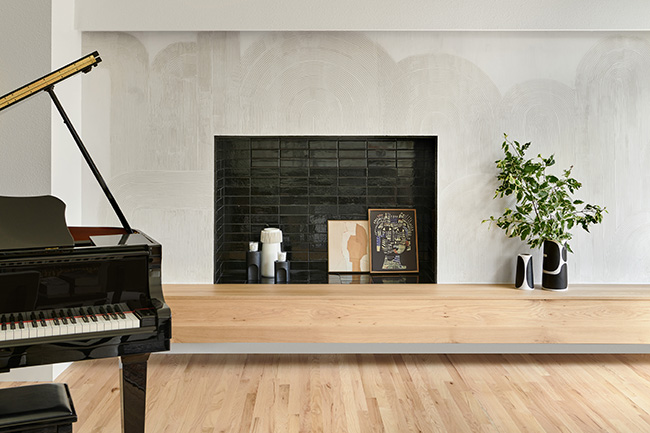Green Guide: Nine Things to Kick Out of the Kitchen
04 Sep 2009
Easy ways to make your home healthier and environmentally friendlier.
 You care about your health and the environment, so you eat organic food and buy furnishings made from sustainably harvested wood. But hidden health dangers most likely lurk in the cabinets of your home’s most popular room—the kitchen. Here are nine health-related issues to consider, and nine natural solutions to make your home healthier.
You care about your health and the environment, so you eat organic food and buy furnishings made from sustainably harvested wood. But hidden health dangers most likely lurk in the cabinets of your home’s most popular room—the kitchen. Here are nine health-related issues to consider, and nine natural solutions to make your home healthier.
PITCH THE PESTICIDES
Nobody likes cockroaches, ants and flies, or pretty much any bug in the kitchen. Manufacturers claim pesticides are safe, but ever since scientist and environmentalist Rachel Carson blew the lid off synthetic pesticides like DDT in 1962, questions about their safety have mounted. Conventional pesticides, like those in ant sprays and pet collars, have been linked to a number of environmental and health problems, including immune-system disorders, hormonal troubles, fetal defects and many cancers. Fortunately, natural pesticides and repellents are available at supermarkets, but you can also create your own. Ordinary household boric acid, for example, is a highly effective yet safe cockroach and ant killer. Sprinkle it liberally around baseboards, under sinks or anywhere cockroaches congregate and they’ll soon disappear. Diatomaceous earth (available at gardening centers) kills roaches and ants, too. Ants also hate spearmint, peppermint, cayenne pepper, clove and cinnamon. Citrus oils, garlic and cedar repel fleas, while sweet basil and clover fend off flies. Citronella, neem and eucalyptus oils ward off mosquitoes. With a little research and effort, you can control insects without synthetic poisons.PITCH THE PLASTIC, TOO
 While you’re in a pitching mood, you might consider getting rid of plastic bottles and containers that contain bisphenol A, or BPA. This chemical has been linked to endocrine, reproductive and metabolic problems, including prostate and breast cancers, impaired immune function, early puberty onset, obesity, decreased fertility and diabetes. Recent studies by the National Toxicology Program of the U.S. Department of Health and Human Services also show it can cause behavioral and hormonal changes in children.
Manufacturers are abandoning BPA-laced water bottles faster than rats flee a sinking ship, and even the giant retailer Wal-Mart has pledged to stop selling baby bottles, pacifiers, food containers and sippy cups that contain BPA by early 2009. Hard plastics, like polycarbonate, can also contain BPA. Many plastics contain BPA, but the only way to know for sure is if your bottle’s got a #7 inside the recycling symbol on the bottom. Replace it with glass, ceramic or reusable stainless-steel bottles, which don’t contain BPA and have the added benefit of reducing landfill waste.
While you’re in a pitching mood, you might consider getting rid of plastic bottles and containers that contain bisphenol A, or BPA. This chemical has been linked to endocrine, reproductive and metabolic problems, including prostate and breast cancers, impaired immune function, early puberty onset, obesity, decreased fertility and diabetes. Recent studies by the National Toxicology Program of the U.S. Department of Health and Human Services also show it can cause behavioral and hormonal changes in children.
Manufacturers are abandoning BPA-laced water bottles faster than rats flee a sinking ship, and even the giant retailer Wal-Mart has pledged to stop selling baby bottles, pacifiers, food containers and sippy cups that contain BPA by early 2009. Hard plastics, like polycarbonate, can also contain BPA. Many plastics contain BPA, but the only way to know for sure is if your bottle’s got a #7 inside the recycling symbol on the bottom. Replace it with glass, ceramic or reusable stainless-steel bottles, which don’t contain BPA and have the added benefit of reducing landfill waste.
CLEAN PANS WITH VINEGAR
 Many common dishwashing soaps contain chemicals implicated in a wide range of health problems, from dry skin and swelling to menopausal symptoms, low male fertility and even cancer. Many dish soaps also release toxic chemicals—some are known carcinogens—into our water supplies. Studies also show that antibacterial soaps may prompt harmful bacteria to become resistant to antibiotics.
Fortunately, there’s a great way to get the job done without harsh soaps, degreasers or—heaven forbid—labor-intensive abrasives like powdered dishwasher soap and baking soda. Vinegar happens to be a harmless product with natural acidity that cleans beautifully. Simply heat the pan on your stove and splash in a little common vinegar. Most stuck-on foods will immediately lift off the pan’s surface. Extremely stubborn foods might require a few more minutes of soaking and some light scraping with a spatula, but vinegar is generally very effective.
Cooks often perform the same task to make gravy from stuck-on bits of browned meat using wine, which is also acidic. The process is called deglazing, and it works just as well for cleaning as it does for cuisine.
Many common dishwashing soaps contain chemicals implicated in a wide range of health problems, from dry skin and swelling to menopausal symptoms, low male fertility and even cancer. Many dish soaps also release toxic chemicals—some are known carcinogens—into our water supplies. Studies also show that antibacterial soaps may prompt harmful bacteria to become resistant to antibiotics.
Fortunately, there’s a great way to get the job done without harsh soaps, degreasers or—heaven forbid—labor-intensive abrasives like powdered dishwasher soap and baking soda. Vinegar happens to be a harmless product with natural acidity that cleans beautifully. Simply heat the pan on your stove and splash in a little common vinegar. Most stuck-on foods will immediately lift off the pan’s surface. Extremely stubborn foods might require a few more minutes of soaking and some light scraping with a spatula, but vinegar is generally very effective.
Cooks often perform the same task to make gravy from stuck-on bits of browned meat using wine, which is also acidic. The process is called deglazing, and it works just as well for cleaning as it does for cuisine.
TRASH THE TEFLON
 Nonstick pans work well, but there’s growing concern among scientists that the chemicals used to make Teflon, including perfluorooctanoic acid (PFOA), cause birth defects and some forms of cancer. It’s also been implicated in miscarriages, immune-system disorders and respiratory problems. Small pets like birds have dropped dead when accidentally exposed to the chemicals released by overheated nonstick pans.
And nobody’s sure how the body is affected when you inadvertently ingest fragments of nonstick coating from a badly worn pan. But here’s a clue: The Environmental Protection Agency’s Science Advisory Board has labeled PFOA “a likely human carcinogen.”
Nonstick pans work well, but there’s growing concern among scientists that the chemicals used to make Teflon, including perfluorooctanoic acid (PFOA), cause birth defects and some forms of cancer. It’s also been implicated in miscarriages, immune-system disorders and respiratory problems. Small pets like birds have dropped dead when accidentally exposed to the chemicals released by overheated nonstick pans.
And nobody’s sure how the body is affected when you inadvertently ingest fragments of nonstick coating from a badly worn pan. But here’s a clue: The Environmental Protection Agency’s Science Advisory Board has labeled PFOA “a likely human carcinogen.”
 Switch instead to stainless steel or cast iron. Yes, it takes practice to learn how to cook certain foods—eggs or breaded pork chops, for example—in these pans. But they’re very durable and a properly seasoned cast-iron skillet can be as easy to clean as a nonstick pan. Plus, you can take satisfaction in knowing you’re not releasing potentially dangerous chemicals into the environment.
Switch instead to stainless steel or cast iron. Yes, it takes practice to learn how to cook certain foods—eggs or breaded pork chops, for example—in these pans. But they’re very durable and a properly seasoned cast-iron skillet can be as easy to clean as a nonstick pan. Plus, you can take satisfaction in knowing you’re not releasing potentially dangerous chemicals into the environment.
DITCH THE DETERGENT
Many conventional dishwashing soaps and laundry detergents contain artificial scents and other chemicals that can harm your health and the environment. Phosphate, for example, is a naturally occurring substance that keeps your drinking glasses sparkling clean, but if too much gets into waterways, algae and phytoplankton feed on it and reproduce like rabbits, causing algal blooms that kill fish and other wildlife. Other detergent chemicals have been linked to breathing difficulties, skin irritations, headaches and fatigue. Switch instead to gentler, more natural products like those made by industry giant Ecover, a Belgium-based company that pioneered the use of phosphate-free, fully biodegradable detergents in the early 1980s. Some people knock natural detergents for poor performance but in recent tests by Consumer Reports, Ecover’s dishwasher detergent ranked second only to Dawn. Many natural cleaners are nontoxic, biodegradable and hypoallergenic, and don’t contain petroleum-based brighteners or scents. Their manufacturers also tend to be environmental models. One of Ecover’s factories, for example, is made from recycled and recyclable materials and reuses wastewater, returning it to the factory with a windmill-driven pump. The factory’s 10,800-square-foot grass-covered roof also insulates the building and supports a wildlife garden. In 1993, the company was named to the Global 500 Roll of Honour by the United Nations Environment Programme.WORRY-FREE WINDOW WASHING
 OK, we admit it—we’re not done praising the wonders of vinegar. The most popular store-bought window-washing products contain ammonia and potentially harmful volatile organic compounds (VOCs). Ammonia works well, but it can irritate the ears, eyes, throat and lungs. Pour it down your drain, and it may kill fish and other pond life, even in low concentrations. Accidentally splash it in your eyes and you may go blind.
Vinegar, on the other hand, is a safe, effective window cleaner. Just mix a quarter-cup of ordinary white vinegar with three cups of water and spray the solution on your windows. You could wipe them dry with paper towels, but that wouldn’t be as green as wiping them with a clean, reusable cloth towel free of fabric softener (which will leave an oily residue and, not surprisingly, isn’t that good for you and Mother Earth, either). Or, for extra old-fashioned sparkle, use crumpled newspaper like your grandparents did.
OK, we admit it—we’re not done praising the wonders of vinegar. The most popular store-bought window-washing products contain ammonia and potentially harmful volatile organic compounds (VOCs). Ammonia works well, but it can irritate the ears, eyes, throat and lungs. Pour it down your drain, and it may kill fish and other pond life, even in low concentrations. Accidentally splash it in your eyes and you may go blind.
Vinegar, on the other hand, is a safe, effective window cleaner. Just mix a quarter-cup of ordinary white vinegar with three cups of water and spray the solution on your windows. You could wipe them dry with paper towels, but that wouldn’t be as green as wiping them with a clean, reusable cloth towel free of fabric softener (which will leave an oily residue and, not surprisingly, isn’t that good for you and Mother Earth, either). Or, for extra old-fashioned sparkle, use crumpled newspaper like your grandparents did.
DISINFECT SAFELY
Chlorine bleach is a popular disinfectant, but it can cause ear, eye, nose, skin and throat irritations. It’s especially dangerous for anyone suffering from heart conditions or chronic respiratory problems, such as asthma or emphysema. The risks are compounded when it’s used in small, poorly ventilated rooms like—surprise!—your kitchen or bathroom. Listed as a hazardous air pollutant in the 1990 Clean Air Act, chlorine in the workplace is regulated by federal standards. When mixed with other chemicals, like ammonia, bleach creates deadly chlorine gas. So why keep bleach around the house when a couple of bottles of harmless vinegar and hydrogen peroxide will do the same job? Vinegar is a powerful natural disinfectant. One study showed that common household 5-percent vinegar mixed in a 1-to-4 ratio with water makes a more effective disinfectant than the industrial disinfectant quaternary ammonium. Ordinary 3-percent hydrogen peroxide also works well. In another study, researchers found that spraying contaminated surfaces with vinegar, followed by spraying with hydrogen peroxide, killed more potentially lethal bacteria—including salmonella, shigella and even E. coli—than chlorine bleach or any other commercially available kitchen disinfectant.FRESHEN NATURALLY
By now, you’ve cleaned your pans, countertops and windows with gallons of Wonder Vinegar and your house smells a little sour. Time for a little commercial air freshener, right? Wrong. Many air fresheners contain phthalates, hazardous chemicals known to cause hormonal abnormalities, birth defects and reproductive problems, according to the Natural Resources Defense Council, which tested 14 common air fresheners. Twelve of the 14 contained phthalate esters that weren’t listed in the ingredients. Some even advertised themselves as “all-natural” and “unscented.” Another study by the National Institute of Environmental Health Services showed that another common ingredient—1,4-dichlorobenzene—might harm lung function, especially in children with asthma and other respiratory problems. 1,4 DCB is also used as an insecticide for moth control.
Switch instead to homemade air fresheners made with natural vanilla, lavender, orange, bergamot or any of your favorite scented oils. Mixed with a little common isopropyl alcohol and water, they can be spritzed into the air when unpleasant odors become acute. Heat-based and electric aromatic diffusers also are available at many natural products stores.
Here’s another novel way to freshen your air: Open your newly cleaned windows.
Many air fresheners contain phthalates, hazardous chemicals known to cause hormonal abnormalities, birth defects and reproductive problems, according to the Natural Resources Defense Council, which tested 14 common air fresheners. Twelve of the 14 contained phthalate esters that weren’t listed in the ingredients. Some even advertised themselves as “all-natural” and “unscented.” Another study by the National Institute of Environmental Health Services showed that another common ingredient—1,4-dichlorobenzene—might harm lung function, especially in children with asthma and other respiratory problems. 1,4 DCB is also used as an insecticide for moth control.
Switch instead to homemade air fresheners made with natural vanilla, lavender, orange, bergamot or any of your favorite scented oils. Mixed with a little common isopropyl alcohol and water, they can be spritzed into the air when unpleasant odors become acute. Heat-based and electric aromatic diffusers also are available at many natural products stores.
Here’s another novel way to freshen your air: Open your newly cleaned windows.












